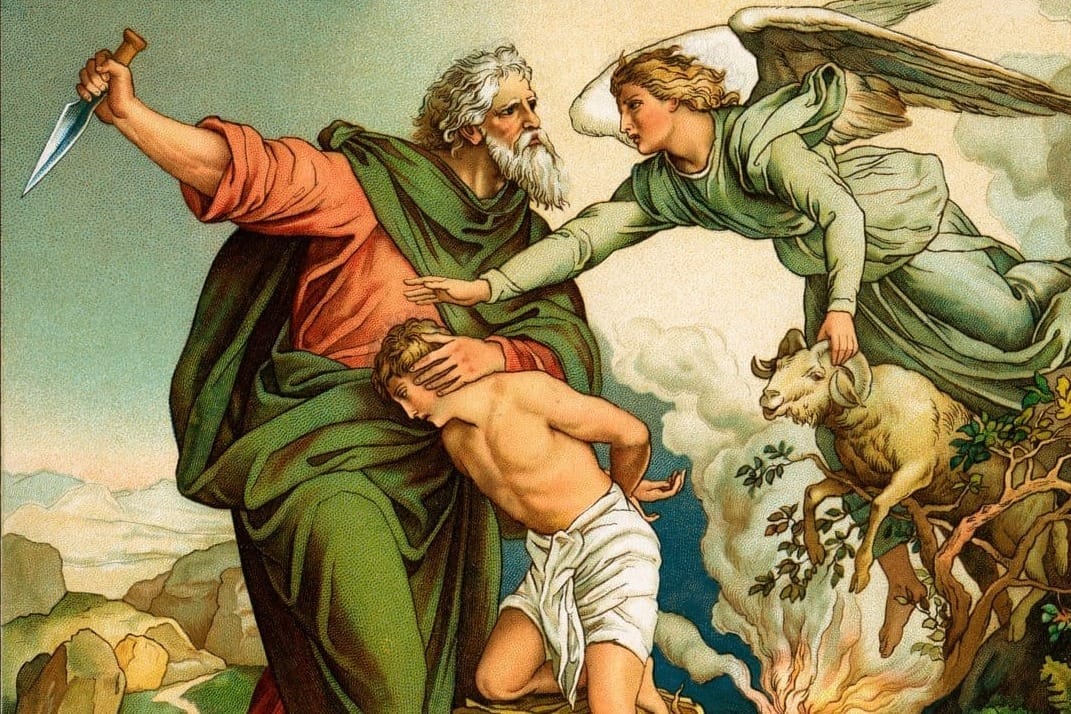Abraham
Abraham believed that God had the power to raise the dead.

Key words
- Revere: to very much respect and admire someone or something
Joe Biden is not widely revered.
- Reaffirm: to state something as true again
The government reaffirmed its commitment to the peace process.
- Foreshadow: to act as a sign of a future event
The recent outbreak of violence was foreshadowed by incidents earlier this year.
- Genealogy: (the study of) the history of the past and present members of a family or families
I became interested in the genealogy of my family after my son was born with ginger hair.
- Eternal: lasting forever
They swore eternal loyalty to each other.
Read the article to find the answers
- Which religions revere Abraham?
- What did Abraham believe about Isaac?
- How does the Gospel of Matthew begin?
- How do Christians believe that the promise of land is fulfilled?
The Promised Land
Abraham, originally known as Abram, is revered as a founding figure in Judaism, Christianity and Islam. His story begins when he left Ur (near modern-day Baghdad), settled in Haran (in modern-day southern Turkey) and was called by God to go to a new land. God promised that He would give Abram and his descendants the land of Canaan (modern-day Palestine), that Abram would become the father of a great nation, and that through him all the nations of the earth would be blessed.
Abram travelled through Canaan and reached Shechem (modern-day Nablus), where God appeared to him and reaffirmed His promise to give the land to his descendants. After Abram settled near Bethel, God then reaffirmed His promise again. Sarai was old and childless, so she gave Abram her servant Hagar to bear a child and ensure they had descendents to pass the land onto. Hagar gave birth to Ishmael.
God changed Abram's name to Abraham, meaning father of many, and Sarai's name to Sarah, meaning princess, and made it clear that His promise would be fulfilled through a son miraculously born to Sarah and not through the normal birth of Ishmael. After Sarah gave birth to Isaac, Abraham travelled to Beersheba where God told him to sacrifice Isaac. Abraham obeyed, but at the last moment God provided a ram as a substitute. Abraham's faith in God was demonstrated by his belief that Isaac would be resurrected. Christians believe that this event foreshadows the resurrection of Jesus.
Abraham in the New Testament
The Gospel of Matthew begins by stating that it is the book of the genealogy of Jesus Christ, the son of David, the son of Abraham.
In the Gospel of John, Jesus declares "Before Abraham was, I am" and challenges the Pharisees' belief that they were Abraham's descendants by saying that if they were Abraham's children, they would do what Abraham did, emphasising that the true descendants of Abraham are spiritual descendants who live by faith, regardless of ethnicity or genealogy.
The Apostle Paul wrote that God's promises to Abraham were fulfilled in Christ, and that all those who have the same faith in God as Abraham had, and believe in the resurrection of Christ, are Abraham's spiritual descendants and are guaranteed access to the Promised Land.
Promises Fulfilled
The promises to Abraham are seen as unconditional, in that God promised the land to Abraham's descendants forever. However, God's covenant with Moses introduced conditions. In Leviticus and Deuteronomy, God promises that if Israel obeys His laws and remains faithful, they will continue to live in the land, but God warns that if Israel disobeys, they will be exiled from the land. This happened when the Israelites disobeyed and were taken to Babylon after the destruction of Jerusalem thousands of years ago, and again when the Jews disobeyed and were exiled after the destruction of Jerusalem in 70 AD.
The Book of Joshua describes how God's promises to Abraham were partially fulfilled thousands of years ago, before the Israelites disobeyed and were taken into Babylon. Many Christians believe that God's promises to Abraham were fulfilled when Abraham's seed, Jesus Christ, came as a blessing to all the nations of the earth. They argue that the promise of numerous descendants is being fulfilled in the growth of Christianity, and that the promise of land has passed from the physical land of Canaan to the eternal heavenly Kingdom of God, which, after the destruction of Jerusalem in 70 AD, is being continually fulfilled each time a believer enters it through faith in Christ.
Discussion questions
- Do you have any questions about any of the vocabulary or grammar in this article?
- What do you know about Ur and the other places where Abraham lived?
- Have you read the Book of Joshua?
- What do you know about the Babylonian exile and 70 AD?

Book a Lesson
Improve your English language communication skills by practicing with a qualified and experienced native speaker.





